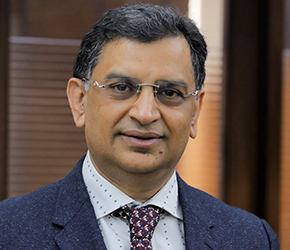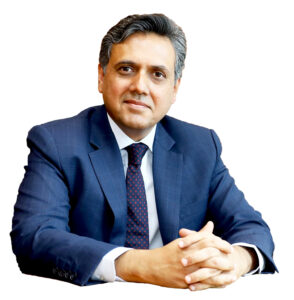Post Budget Reactions From Healthcare Industry 2024
Dr. Azad Moopen, Founder & Chairman, Aster DM Healthcare It is heartening to see that the Interim Union Budget focuses on the upliftment of the masses through specific focus on the poor, farmers, youth and women.

 Dr. Azad Moopen, Founder & Chairman, Aster DM Healthcare
Dr. Azad Moopen, Founder & Chairman, Aster DM Healthcare
It is heartening to see that the Interim Union Budget focuses on the upliftment of the masses through specific focus on the poor, farmers, youth and women. The allocation of Rs. 1-lakh crore with 50-year interest free loans will encourage the start-up culture that India is now thriving upon, encouraging the youth of today to become entrepreneurs and focus on their growth as well growth of the nation.
In healthcare we were hoping to see an increase in the GDP allocation of minimum 5% for the sector, hopefully this will be addressed in the complete Budget to be announced in July this year, under the new government. We are glad that the government is considering to add more hospitals in all districts in the country, which is essential to meet the rising demand. We would recommend focusing on public-private partnerships (PPP) to address this. With all maternal and child healthcare to be brought under one- scheme, this will be essential.
It is promising to hear that government plans to open more medical colleges alongside existing hospital infrastructure. There is now an urgent need for comprehensive reform of medical education, to ensure that the medical professionals of tomorrow are trained in the latest medicine and techniques, like their western counterparts.
The strong impetus on immunisation of children under Mission Indradhanush and young girls for cervical cancer will go a long way in strengthening preventive care measures in the country and reduce the burden from communicable and non-communicable diseases.
………………………………………………………………………………………………………………………………………………………………………………………………………………….

Dr. Minnie Bodhanwala, CEO, Wadia Hospitals
There needs to be rationalization of GST and additional subsidies to healthcare providers for utilities like power, etc., will also help to make care more affordable for the masses.
Increasing the expenditure on healthcare, and its utilization by implementing schemes efficiently, will help in increasing the health of population at large and reviving and strengthening our economy even further. On policy interventions in the healthcare sector the state policies need to align with the healthcare objectives at large at the national level.The Interim Budget 2024 with allocation of 90,171 crores for health and infrastructure will help improve our overall Healthcare Ecosystem. It is a welcome step by the Government to increase medical colleges in existing hospitals that will help increase the health workforce in the future. It will also be interesting to see the application of these initiatives and how PPP can help in making quality healthcare more affordable for all. The infrastructure aligned with the previously launched National Digital Health Ecosystem will help bring some much-needed standardisation in the Healthcare sector; it will also boost the growth of the Healthcare Insurance and benefit the community at large. While the overall prospect looks encouraging in the interim budget we will have to wait for the final strategy on how the gaps in healthcare availability and education will be addressed.
…………………………………………………………………………………………………………………………………………………………………………………………………………………………
 Rajiv Nath, Managing Director, HMD
Rajiv Nath, Managing Director, HMD
Forum Coordinator, Association of Indian Medical Device Industry (AiMeD)
Mr. Rajiv Nath on behalf of the Indian Medical Devices Industry has praised the interim Union Budget 2024 as a comprehensive continuity of the earlier roadmap for India’s ‘Atmanirbhar Bharat’ during the Amrit Kaal but Mr. Nath also pointed out that we await the fine print to study if Department of Pharmaceuticals recommendations have been addressed as seemingly the budget has fallen short of expectations for addressing the rising import graph of medical devices and soaring import bills worth over Rs 63,200 crore ($8 billion).
Mr. Nath commended the government’s focus on ‘Nation First’, accelerated infrastructure development, research and development, skill development, sustainability, digitalization, innovation, low-interest rate financing for research and development in the pharma and tech sector, and youth and women empowerment. Specifically, Nath applauded the announcements regarding the establishment of medical colleges and the expansion of preventive vaccination and Ayushman Bharat to ASHA and Aganwadi workers.
Mr. Nath also welcomed the port connectivity corridors and high traffic density corridors through PM Gati Shakti and the focus on Northeastern states as it will improve supply chain management and infrastructure.
Nath’s comments suggest that the domestic medical technology industry may benefit from the budget’s focus on green growth, youth and women empowerment, and farmer centricity, which are aligned with Vision 2047, and the principle of reform, perform, and transform will ensure that India has a modular economic structure for all sections of business and society during the Kartavya Kal, enabling India to address global challenges and sustain development.
We do hope to see in the fine print action on the assurances from various government departments to implement the National Medical Devices Policy 2023 and make it attractive and profitable to make in India rather than import into India .
The Indian Medical Devices Industry’s expectations were:
1. Increase in Custom Duty to a nominal 10%-15% Duty and a predictable tariff policy
2. Correction of Inverted Duty by levying Health Cess of 5% custom duty on balance Medical Devices (this was not earlier applied to all HS Codes). Cess is used for Ayushman Bharat.
3. Trade Margin capping by monitoring MRP of Imports (if over 10 – 20 times of CIF)
4. Income Tax benefits for project investments in Medical Devices Manufacturing.
As per GTRI report of August 2023, the Indian medical devices industry can expand from $12 billion to $50 billion by 2030, reducing import reliance to 35% and boosting exports to $18 billion. Supporting policies are needed so that Indian Medical Devices Industry can make quality healthcare accessible and affordable for the common masses, aim to place India among the top five medical devices manufacturing hubs worldwide and help end the 80-85 per cent import dependence forced upon us and an ever-increasing import bill of over 63,200 Crore.
We can only be hopeful that the fine print of the Union Budget would possibly act upon our recommendations, said an ever optimistic Mr. Rajiv Nath who has been persevering to work with the Government in making India as leading manufacturing global hub.
……………………………………………………………………………………………………………………………………………………………………………………………………………………………………………………………………………………..

Himanshu Baid, Managing Director, Poly Medicure Ltd.
We welcome the interim budget 2024 for the healthcare sector. These initiatives underscore the government’s commitment to promoting preventive healthcare measures, enhancing access to medical services, and strengthening the healthcare infrastructure across the nation.
The decision to encourage vaccination against cervical cancer among girls aged 9-14 years is a significant step towards combating the disease and safeguarding the health of our future generations. Furthermore, extending health cover under the Ayushman Bharat scheme to ASHA and Anganwadi workers recognizes their invaluable contribution to community healthcare and ensures their well-being.
The government’s plan to establish more medical colleges by utilizing existing hospital infrastructure is praiseworthy and will help address the shortage of healthcare professionals in the country. The consolidation of maternal and child healthcare schemes into a comprehensive programme will streamline service delivery and improve healthcare outcomes for women and children.
We are pleased to note the emphasis on upgrading Anganwadi centres under ‘Saksham Anganwadi’ and Poshan 2.0, which aligns with our commitment to promoting early childhood care and development. The introduction of the ‘U-Win’ platform for managing immunization reflects a concerted effort to strengthen vaccination programs and prevent the spread of infectious diseases.
The announcement regarding the establishment of new nursing colleges co-located with medical colleges is a positive development that will bolster the nursing workforce and enhance healthcare services across the country. Additionally, the mission to eliminate sickle cell anaemia by 2047 underscores the government’s proactive approach towards addressing prevalent health challenges and improving public health outcomes.
The MedTech sector is willing to collaborate with the government and healthcare stakeholders to support the implementation of these initiatives and contribute to building a healthier and more resilient India.
We look forward to leveraging our expertise and resources to drive positive change and improve healthcare access and outcomes for all segments of society.
……………………………………………………………………………………………………………………………………………………………………………………………………………………………………………………………………………………..
 Anish Bafna, CEO and MD, Healthium Medtech
Anish Bafna, CEO and MD, Healthium Medtech
The Interim Budget of 2024 lays the foundation for our nation’s relentless roadmap towards Viksit Bharat 2047. The allocated corpus of 1 lakh for R&D and the new scheme to develop deep tech for defense purposes, along with 50-year interest-free loans, is a promising step to encourage the private sector towards scaling up research and innovation significantly in the sunrise sectors. The increased impetus on maternal and childcare schemes will boost overall public health. Furthermore, tailored initiatives like Poshan 2.0 and increased penetration under the Ayushman Bharat scheme will go a long way to improve and aid nutrition delivery, early childhood care and development in rural last-mile communities. However, pragmatic guidelines are still required to prioritise the adoption of the latest technologies for better clinical outcomes and improving patient centricity.

Dr. A M Shafiq
Co-Founder and CEO, Trilife Hospital.
“The Union Budget’s continued focus on strengthening India’s healthcare system is encouraging. The allocation of ₹90,658.63 crore for the health sector is a significant step forward. It builds upon the strong foundation laid by the interim budget, particularly in areas like maternal and child health. The healthcare announcements reflect the government’s commitment to make healthcare more affordable and accessible to the common man. Cheaper medical equipment cost and custom duty changes on X-ray tubes and flat panel detectors will lead to more accessible diagnostic tools and promote Atmanirbhar Bharat. The exemption of three essential cancer drugs from customs duties is a crucial step in making life-saving treatments more accessible to patients across the country.”
……………………………………………………………………………………………………………………………………………………………………………………………………………………………………………………………………………………..
 Dr. Vivek Desai, Founder & Managing Director HOSMAC (Asia’s leading hospital planning, design and management consultancy).
Dr. Vivek Desai, Founder & Managing Director HOSMAC (Asia’s leading hospital planning, design and management consultancy).
The Government’s efforts to improve India’s healthcare is clearly expressed in the interim budget outlay for FY 2024-25. The overall healthcare budget has increased from INR 80,518 cr in FY 2023-24 to INR 90,659 cr in this financial year, which is a hike of more than 11%.
Extending Ayushman Bharat PM-JAY coverage to include our large army of frontline healthcare staff i.e. ~10 lakh ASHA workers and ~25 lakh anganwadi workers is a much-deserved step and will aid as an incentive as well. Allocation towards PM-JAY sees an increase of INR 6,800 cr to INR 7,500 cr.
To address the dearth of doctors in India, the government has thoughtfully planned to set up medical colleges by utilizing the existing hospital infrastructure. Another component that sees a prominent hike is that of Pradhan Mantri Ayushman Bharat Health Infrastructure Mission (PM ABHIM), from INR 200 cr in FY 2023-23 to INR 468 cr in 2024-25. PM ABHIM focuses on developing capacities of health systems and institutions across the continuum of care with an aim on building resilience. Allocation towards National Health Mission (NHM) has marginally increased from INR 31,551 cr to INR 31,967 cr. Synergising various schemes of maternal & child care into one comprehensive programme promises a more efficient implementation system. Furthermore, schemes such as Poshan 2.0 will help improve nutrition delivery, early childhood care, and development.
With the introduction of cervical cancer vaccination for women aged 9-14 years, preventive health looks high on government’s agenda. Leveraging digital technology with the introduction of U-Win platform to document immunisation coverage is another sign of this commitment. Another encouraging announcement is that of establishing a corpus of INR 1,00,000 cr with fifty-year interest free loan, which will certainly push the private sector and health-tech start-ups to scale up research and innovation.
Healthcare infrastructure will also see indirect benefits from Gati Shakti that enables multi-modal connectivity, by improving supply chain management and reducing overall costs.
All in all, the interim budget FY 2024-25 for healthcare seems like a holistic, inclusive and forward-looking one.
…………………………………………………………………………………………………………………………………………………………………………………………………………………………………………………………………..
 Sanjaya Mariwala, Founder & Managing Director HOSMAC (Asia’s leading hospital planning, design and management consultancy).Managing Director, OmniActive Health Technologies Ltd. India and President, Association of Herbal and Nutraceutical Manufacturers of India (AHNMI)
Sanjaya Mariwala, Founder & Managing Director HOSMAC (Asia’s leading hospital planning, design and management consultancy).Managing Director, OmniActive Health Technologies Ltd. India and President, Association of Herbal and Nutraceutical Manufacturers of India (AHNMI)
The government’s mantra of ‘Sabka Saath, Sabka Vikas, Sabka Vishwas’ echoes through many initiatives. Extending healthcare cover under the Ayushman Bharat scheme to all ASHA (Accredited Social Health Activists) workers, Anganwadi Workers and Helpers is a welcome decision. And the confidence expressed by the FM in the recently announced India-Middle East-Europe Economic Corridor will further inspire the business community. The Corridor will also foster initiative, self-reliance and a comprehensive adoption of the ‘China Plus
One’ strategy.
……………………………………………………………………………………………………………………………………………………………………………………………………………………………………………………………………………………..

Dr. Sanjeev Singh, Medical Director, Amrita Hospital, Faridabad
SMT welcomes the Interim Union Budget 2024 that is a detailed roadmap of the government’s continued focus on ‘AtmanirbharBharat’ during the Amritkaal for a ‘ViksitBharat’. The government’s strong approach towards ‘Nation First’ and accelerating infrastructure development, R&D, skill development, and sustainability along with digitalisation push will give a strong impetus to the overall economy. We particularly applaud the key announcements of Medical Colleges being planned which will increase the health ambit, Ayushman Bharat scheme extended to ASHA and Aanganwadi workers & expansion of preventive vaccination especially cervical cancer, which takes forward the preventive and curative healthcare aspirations of the government to achieve Universal Health Coverage.
The acknowledgement of innovation and long term financing at low interest rates for R&D led pharma and tech sector along with focusing on youth & skill development is a positive indicator for the Domestic MedTech Industry which is largely import dependent and now moving towards high end manufacturing of medical technologies. Port connectivity corridors and high traffic density corridors through PMGatiShakti and the focus on Northeastern States is a welcome move for the industry as supply chain management and infrastructure gets an optimal push as well as ensuring that goods and services reach up to the ‘Last Mile’ to improve availability, accessibility, and ultimately affordability. The other key announcements towards Green Growth, Youth & Women empowerment and farmer centricity is fully aligned to Vision2047 with GDP defined as Governance, Development and Performance on the principle of reform, perform and transform will ensure that India treads on a modular economic structure for every section of business and society as we enter the KartavyaKal and realise India’s aspirations to address global challenges and sustain development.
……………………………………………………………………………………………………………………………………………………………………………………………………………………………………………………………………………………..
 Gaurav Agarwal, Managing Director, Innvolution Healthcare Pvt. Ltd & Innovation Imaging Technologies Pvt. Ltd.
Gaurav Agarwal, Managing Director, Innvolution Healthcare Pvt. Ltd & Innovation Imaging Technologies Pvt. Ltd.
Innvolution Group wholeheartedly applauds the interim budget 2024-25, emphasizing the government’s unwavering commitment to champion preventive healthcare, bolstering healthcare infrastructure, and driving India’s evolution into an advanced manufacturing and knowledge-centric economy on a resoundingly positive path. We firmly endorse and stand behind the robust initiatives outlined in the budget, foreseeing a powerful momentum for the nation’s progress and prosperity.
We commend the government’s commitment to expand healthcare infrastructure across all districts, essential to meet the increasing demand; Innvolution Healthcare is aligned with this vision, aspiring to establish Cathlabs in every district, with a strong recommendation for fostering public-private partnerships (PPP) to realize this transformative healthcare goal. Government’s visionary initiatives in the 2024-25 budget, particularly its pioneering commitment to prioritize cervical cancer vaccination for young girls and the integration of maternal and childcare schemes under the U-WIN platform coupled with the extension of Ayushman Bharat to ASHA workers, Anganwadi workers and helpers will make a groundbreaking leap towards comprehensive healthcare and welfare.
The allocation of 30 crore MUDRA Yojana loans to women entrepreneurs in Budget 2024 reflects a commendable commitment to advancing women’s entrepreneurship, fostering ease of living, and dignifying their roles, thereby propelling the startup ecosystem and contributing to the unprecedented growth of the Indian economy.
The establishment of a 1 lakh crore corpus for long-term, zero or low-interest financing in sunrise sectors is a laudable step in alignment with Prime Minister Narendra Modi’s vision of JAN Anusandhan, aimed at elevating research and innovation. With an increased allocation to Research and Development, India’s medical devices industry, which currently relies significantly on imports (80%), is poised to transform into an innovation hub, reducing dependency and propelling towards self-sufficiency, fostering a robust and technologically advanced domestic sector.
As esteemed participants in India’s health narrative, The medtech sector in India stands ready to engage in collaborative efforts with the government and healthcare partners, enthusiastically endorsing the execution of these initiatives. Our collective commitment is geared towards actively contributing to the development of a more robust and flourishing health landscape for India.
……………………………………………………………………………………………………………………………………………………………………………………………………………………………………………………………………………………..
 Sanjiv Navangul, Managing Director & CEO, Bharat Serums and Vaccines Ltd. (BSV)
Sanjiv Navangul, Managing Director & CEO, Bharat Serums and Vaccines Ltd. (BSV)
We are encouraged with the recent budget announcement that lays emphasis and much-deserved attention on women’s health. With all maternal and child healthcare schemes under one comprehensive programme, the collective vision of Healthy Women, Healthy Pregnancies and Healthy Future is turning into reality. Added to this, HPV vaccinations for girls in the 9-14 age group for the prevention of cervical cancer, immunisations of children, and schemes such as Poshan 2.0 will help improve nutrition delivery, early childhood care, and development.
The government’s efforts to build capabilities and domestic capacities will augment the existing healthcare infrastructure and will ensure that healthcare reaches every home in India.
………………………………………………………………………………………………………………………………………………………………………………………………………………………………………………………………………………………………………………………..
 Ganesh P Sabat, CEO, Sahajanand Medical Technologies Ltd and Co-Chair, FICCI Medical Devices Committee
Ganesh P Sabat, CEO, Sahajanand Medical Technologies Ltd and Co-Chair, FICCI Medical Devices Committee
SMT welcomes the Interim Union Budget 2024 that is a detailed roadmap of the government’s continued focus on ‘AtmanirbharBharat’ during the Amritkaal for a ‘ViksitBharat’. The government’s strong approach towards ‘Nation First’ and accelerating infrastructure development, R&D, skill development, and sustainability along with digitalisation push will give a strong impetus to the overall economy. We particularly applaud the key announcements of Medical Colleges being planned which will increase the health ambit, Ayushman Bharat scheme extended to ASHA and Aanganwadi workers & expansion of preventive vaccination especially cervical cancer, which takes forward the preventive and curative healthcare aspirations of the government to achieve Universal Health Coverage.
The acknowledgement of innovation and long term financing at low interest rates for R&D led pharma and tech sector along with focusing on youth & skill development is a positive indicator for the Domestic MedTech Industry which is largely import dependent and now moving towards high end manufacturing of medical technologies. Port connectivity corridors and high traffic density corridors through PMGatiShakti and the focus on Northeastern States is a welcome move for the industry as supply chain management and infrastructure gets an optimal push as well as ensuring that goods and services reach up to the ‘Last Mile’ to improve availability, accessibility, and ultimately affordability. The other key announcements towards Green Growth, Youth & Women empowerment and farmer centricity is fully aligned to Vision2047 with GDP defined as Governance, Development and Performance on the principle of reform, perform and transform will ensure that India treads on a modular economic structure for every section of business and society as we enter the KartavyaKal and realise India’s aspirations to address global challenges and sustain development.
……………………………………………………………………………………………………………………………………………………………………………………………………………………………………………………………………………………..
Hariharan Subramanian, Managing Director,  Siemens Healthcare Private Limited
Siemens Healthcare Private Limited
It is imperative to strengthen healthcare infrastructure in India to manage the growing demand. In its journey of catering to the present and being prepared for future needs, the budget emphasizes on better access to healthcare.
In the fiscal year 2024-25 budget, the government revealed an ambitious plan for strengthening the healthcare sector in India. The emphasis on establishing medical colleges within existing hospital infrastructures is game-changing, resulting in a significant rise of healthcare professionals while expanding and enhancing healthcare accessibility across the country.
A notable step was taken towards cervical cancer awareness, encouraging vaccination for young girls, further augmenting our efforts in enhancing the cancer care continuum, and closing the care gap, thereby creating a future without fear of cancer. Extending healthcare coverage under Ayushman Bharat is an inclusive strategy that ensures quality healthcare for everyone, everywhere.
The budget also embraces new technology and promotes digital transformation, setting the path for economic potential and cost-effective, high-quality healthcare services across India. Fostering growth in the MedTech sector while emphasizing on achieving its vision of Atmanirbhar Bharat.
Overall, this budget aims to empower the healthcare sector for a healthier, stronger India
……………………………………………………………………………………………………………………………………………………………………………………………………………………………………………………………………………………..
 Dr. Gayatri Kamineni, COO, Kamineni Hospitals on the Healthcare Focus.
Dr. Gayatri Kamineni, COO, Kamineni Hospitals on the Healthcare Focus.
We appreciate the government’s decision to extend healthcare benefits to ASHA and Anganwadi workers under the Ayushman Bharat scheme. This expansion will extend healthcare services not only to frontline healthcare workers but also to the underprivileged communities.
The initiative to establish additional medical colleges using existing infrastructure will address the shortage of healthcare professionals, promising better healthcare delivery and patient outcomes.
Furthermore, vaccinating girls aged 9-14 years against cervical cancer is commendable, prioritizing prevention over prevention to improve public health.
However, we are disappointed with the absence of GST reductions on essential medicines and tax concessions on generic pharmaceuticals in the budget. Affordable healthcare is vital, and these measures reduce the burden on patients while encouraging innovation.
We urge the government to rethink these aspects to ensure equitable access to essential medicines.
Overall, these budget initiatives underline the government’s commitment to healthcare. We look forward to collaborating to ensure their successful implementation to benefit all citizens.
……………………………………………………………………………………………………………………………………………………………………………………………………………………………………………………………………………………..
 Harish Trivedi, CEO, CTSI – South Asia
Harish Trivedi, CEO, CTSI – South Asia
I often say “Every small step is a giant leap in the fight against Cancer” so, At the outset, let me congratulate the FM and the Govt for announcing & committing itself to the cause of cancer by Vaccinating all girls aged 9 to 14 years against Cervical cancer. It’s a step in the right direction to reduce the cancer disease burden and loss of life. India detects approximately 1.8lakh new cervical cancers every year and 50% of these patients succumb to the disease in the same year. Most advanced nations have either eliminated or are on the verge of eliminating the cervical cancer through effective vaccination against HPV, a major cause of Cervical cancer. For all women aged between 9 to 14 years if vaccinated effectively the disease can be eliminated within one generation. I am equally happy to see the GOI announcing using existing infra for new medical colleges, which helps in better capacity utilization of the healthcare infra but at the same time solves accessibility and availability issues for the large underserved population of the country. I would sum it up as a good beginning despite it being an interim budget only.”
……………………………………………………………………………………………………………………………………………………………………………………………………………………………………………………………………………………..
 Dr. K. Anand Kumar, MD, Indian Immunologicals
Dr. K. Anand Kumar, MD, Indian Immunologicals
I commend the initiatives outlined in the Interim Budget 2024, particularly those addressing women and children’s health. These measures signify a concerted effort to strengthen India’s healthcare system by prioritizing preventive care, expanding access to essential services, and leveraging innovation for better health outcomes.
The decision to provide and actively encourage cervical cancer vaccines for 9–14-year-olds reflects a proactive approach to preventing a significant health burden among young girls. Cervical cancer is the fourth most common cancer in women globally, with millions of cases reported annually. Investing in this preventive measure is poised to reduce the incidence of cervical cancer and its associated morbidity and mortality rates in the future.
The budget has also allocated INR 1 lakh crore towards establishing a corpus, offering a 50-year interest-free loan to scale up research and innovation significantly in sunrise industries. This allocation presents a promising advancement within the vaccine industry. It allows for the integration of new-age technologies in vaccine development processes, especially for mRNA and Adenoviral vector vaccines.
……………………………………………………………………………………………………………………………………………………………………………………………………………………………………………………………………………………..
 Ayanabh Debgupta, Jt. Managing Director, Medica Group of Hospitals
Ayanabh Debgupta, Jt. Managing Director, Medica Group of Hospitals
Government’s announcement of U-Win platform for streamlined immunization is a remarkable step and this will boost the immunization drive. The provision to set up more medical colleges is certainly the need of the hour to address the demand supply gap vis-a-vis Doctor’s to patient ratio. However, the most crucial aspect is the cervical cancer vaccination for the girls aged between 9 to 14 years. This will give the cancer screening a huge impetus and will spread the much-needed awareness. Though we know this was an interim budget we were expecting government to bring down the customs duty on general & oncology medical equipment. To provide optimal care at affordable rates, the recent increase in customs duty for general and oncology medical equipment. The customs duty for general equipment has risen from 14.57% to 22%, and for oncology equipment, it has increased from 30.48% to 36.64%. We are hopeful that Government shall address this during the final budget for 2024-25.


